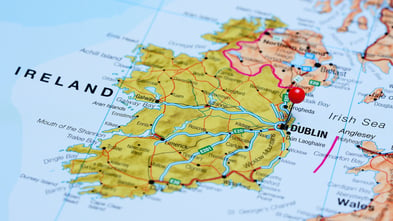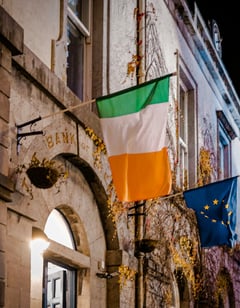
Discover Ireland
the magic island...
Ireland, an emerald island in northwest Europe, captivates visitors with an irresistible combination of natural beauty and vibrant culture. Situated to the north-east of the United Kingdom, with which it shares the island, Ireland is distinguished by its breathtaking scenery of green meadows, rugged cliffs and unspoilt beaches that stretch along its Atlantic Ocean coastline.
With a population of approximately 4.9 million people living in a territory of 84,421 square kilometres, Ireland is characterised by its rich cultural heritage, blending the ancient traditions of Celtic culture with the profound influence of Christianity. This fusion is reflected in the folk music, ancient traditions, historical and religious sites, and the warmth and hospitality of the Irish people.
Despite a turbulent history marked by independence struggles, emigration and religious conflict, Ireland has experienced remarkable economic and social growth in recent decades. Dublin, its cosmopolitan capital, and cities such as Galway and Cork, with their traditional charm, are examples of the dynamism and modernity that characterise the country today.


About the country
History and Culture.
Ireland: Land of History, Culture and Resilience
Indigenous Roots: Gaelic culture forms the basis of Irish identity. Gaelic language, traditions and mythology have been passed down for centuries, shaping everything from storytelling to social customs.
Meeting of Cultures: Irish history features encounters with Vikings, Normans and English settlers. These influences can be seen in the architecture, the language (English became the second official language) and even in some cultural practices.
Independence and Challenges: The long struggle for Irish independence culminated in the formation of the Republic of Ireland in 1916. However, the road since then has not been smooth, with social unrest and political strife marking the 20th century.
Resilience and Modernity: Despite the challenges of the past, Ireland has become a modern and prosperous nation. A strong focus on education and technological innovation has driven economic growth.
Cultural Characteristics:
Gaelic Language and Literature: While Irish Gaelic is less prevalent today, its influence on English dialects and the rich tradition of Irish literature remains strong.
Music and Dance: Irish music is known for its jigs, reels and soulful ballads. Instruments such as the fiddle, Irish bagpipes and bodhrán fill the pubs with music, while traditional dances such as the step dance showcase the cultural vibrancy.
Storytelling and Mythology: Irish mythology, with its tales of brave heroes, fantastic creatures and otherworldly realms, continues to capture the imagination. Pub storytelling nights are a much-loved tradition.
Sports and Pub Culture: Gaelic games such as hurling and Gaelic football are deeply rooted in Irish culture. Pubs are social centres that offer not only drinks, but also a place to talk, listen to music and socialise with the community.
Food and Drink: Irish cuisine is characterised by hearty stews, fresh seafood and delicious breads such as soda bread. Irish whiskey and Guinness stout are world-renowned drinks.
A warm welcome: Renowned for its hospitality, Ireland offers visitors stunning scenery, a rich cultural heritage and the opportunity to experience the warmth of the Irish people.


The harp is the national symbol of Ireland.
The Irish harp, more than a musical instrument, is a cultural treasure that resonates with the vibrations of Ireland's history and national identity. From its ancestral roots to its present-day presence, the harp has woven a unique soundtrack that accompanies the nation through time.
The most pubs per capita in the world.
Ireland is known for many things: its green landscapes, its rich history, its vibrant culture... and, of course, its pubs. In fact, Ireland has the most pubs per capita in the world, with an estimated one pub for every 1,000 people.
Guinness World Records originated in Dublin.
Dublin as home: The Guinness Book of World Records headquarters was established in Dublin, where it remains to this day. The city becomes a symbol of the quest for human achievement and the celebration of the extraordinary.
The city of Dublin was founded by Vikings.
Dublín, Ireland's capital, holds a fascinating secret: its Viking origins. Although today the city is a modern, cosmopolitan metropolis, its foundations lie in a past marked by Norse incursion and trade.
St. Patrick's Day, with parties and parades all over the country.
St. Patrick's Day celebrated on 17 March, is an annual holiday commemorating the death of St. Patrick, the patron saint of Ireland. Although it originated as a religious holiday, St. Patrick's Day has become a global celebration of Irish culture.
Ireland's unique curiosities.
info@paraguayosenirlanda.ie


Relationship with:
Web develop and content: Lucas Grisetti




